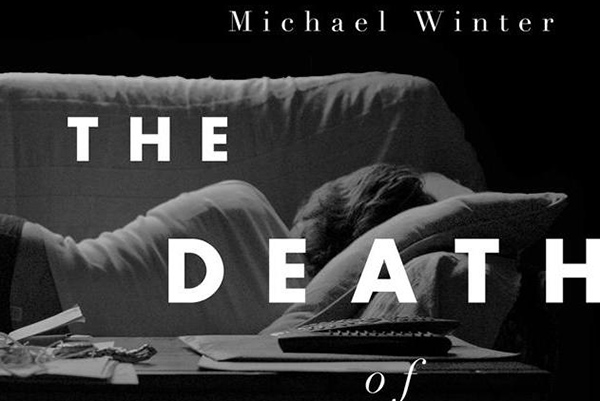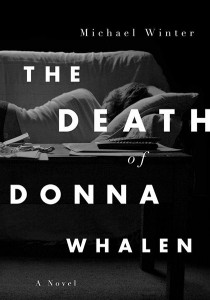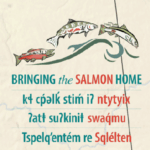Home »

Winter novel a good but not easy read
Book Review
By Derryll White
Winter, Michael (2010). The Death of Donna Whalen.
 This novel is from an accomplished Newfoundland writer, Michael Winter. It is quite different from what I usually read in that it is neither fiction or non-fiction, rather it is documentary fiction. The writer pulls the reader into events which transpired in his home town of St. John’s, Newfoundland. Aware of what Truman Capote did so long ago in his 1966 novel ‘In Cold Blood,’ Winter sets out to weave his way through legal and personal statements in search of the truth about Donna Whalen’s murder,
This novel is from an accomplished Newfoundland writer, Michael Winter. It is quite different from what I usually read in that it is neither fiction or non-fiction, rather it is documentary fiction. The writer pulls the reader into events which transpired in his home town of St. John’s, Newfoundland. Aware of what Truman Capote did so long ago in his 1966 novel ‘In Cold Blood,’ Winter sets out to weave his way through legal and personal statements in search of the truth about Donna Whalen’s murder,
As a writer of conscience Winter wanted more than a statement of facts, an exploitation of the life and character of a dead innocent woman. So he chose to use the factual material to look at the impacts on the city, the legal system and the social continuance of life after Donna Whalen’s demise. Winter has created a challenging fiction which pushes all the boundaries in its quest to discover how all of us live our lives, hopefully honourably.
Winter picks up the cadence and dialect of Newfoundland and uses it to great advantage in establishing a perception of place. This isn’t a story that is happening just anywhere, although the substance of it does apply to all provinces, all countries. This story is definitely playing out in St. John’s, Newfoundland! The way the author uses transcripts and court records is pretty seamless and the story flows. The reader feels as if access is provided directly into the life of the main characters.
The reader gets an impression of a hard life that is not necessarily bleak. The prescription drug abuse and occasional violence are cushioned by a sense of a very social community scene – Donna Whalen knew and had social relations with a lot of people on a continuing basis. The reader gets a sense that this is still common in Newfoundland, unlike much of the rest of Canada.
Winter uses the voices and testimony of many people to build the characters of Donna Whalen and Sheldon Troke. By doing it this way the reader gets a very real insight into who these people are. There isn’t any judgment, just many sometimes conflicting sometimes harmonizing statements from young and old, family, friends and casual acquaintances. I like it as it reveals more than an author usually gives the reader about what drives a character.
The transcripts yield insights and turns of phrase that authors often don’t come up with. A case in point, Donna Whalen got into a discussion with Sheldon’s parole officer Alan regarding abuse. Sheldon was being locked up for hitting her. “….Donna said it never took place and Alan said, ‘Sheldon tells me you are arguing a lot,’ and Donna asked was his relationship the little white house with the picket fence?” I like the direct access to the event and characters of this novel.
The details are fun. Nowhere in fiction have I encountered accounts of officers working hard to develop evidence only to prove sloppy police work. And nowhere have I seen testimony to the fact that women wear their multiple jewelry charms to bed. A whole new insight!
Death is not an event. It is a process. Winter provides a whole new insight into the mystery/crime genre with this book. The unalloyed unambiguous statements from many facets of the legal investigative process encourages the reader to analyze both the fact and fiction of a murder. It is a revealing process and I will never read Cornwell or Nesbo, Mosley or Lerscroart in quite the same way again.
Sheldon Troke eventually determines he is being charged for the murder of Donna Whalen. How he finds this out is very revealing. He is arrested by two armed members of the St. John’s constabulary on parole violation. Locked up inside another inmate handed him a newspaper and asked was there anyone locked up for the Whalen murder? Replying that he didn’t know Sheldon then read that the public shouldn’t worry because the murderer was in jail. Throughout the book the reader is left to wonder about the cruel rights of the underclass.
Not an easy read, but a good one.
TRUTH – “A truth is something that happened and you say it happened, and a lie is something you made up and it didn’t happen.” [Sharon Whalen – Donna’s daughter]
 Derryll White nce wrote books but now chooses to read and write about them. When not reading he writes history for the web atwww.basininstitute.org.
Derryll White nce wrote books but now chooses to read and write about them. When not reading he writes history for the web atwww.basininstitute.org.







